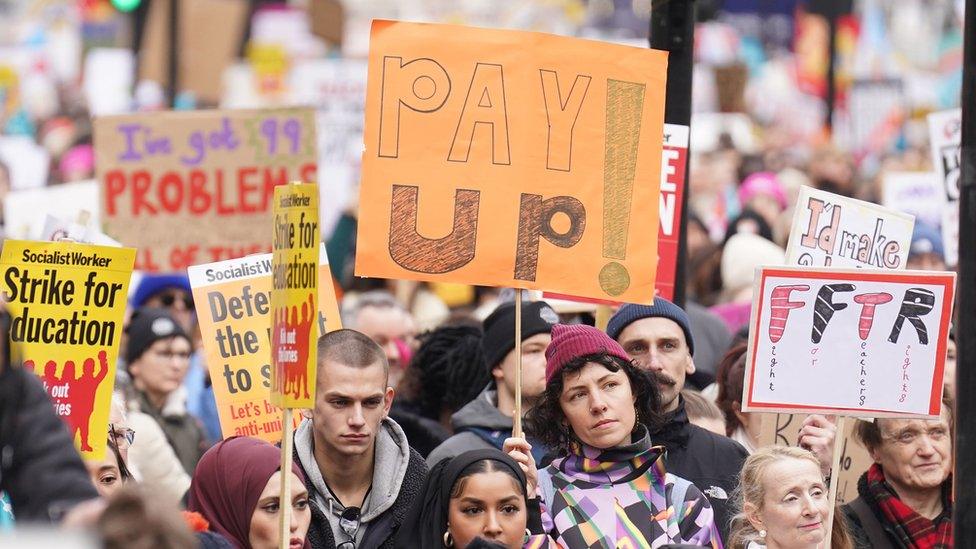Will the wave of strikes ever end?
- Published

The TUC held a march in central London on Wednesday
The least surprising development this year has been a prolonged wave of strikes.
The government has been heading towards an industrial action iceberg for a year now, since inflation, the rate at which prices increase, started to rise sharply.
It is less than a year ago that Andrew Bailey, the governor of the Bank of England, told me that workers should not make excessive pay demands. The remarks were met with consternation from unions and were also slapped down by Number 10.
At that time, Boris Johnson's administration was telling all to expect higher wages - although then-Chancellor Rishi Sunak's Treasury were deeply uneasy.
So, abstracting from a series of different disputes, some in different administrations, there is some value in looking at the bigger picture.
The unions say workers need and deserve double-digit rises to prevent an acute fall in living standards. And they say functioning public services need to staunch the flow of lost workers. The government says that will cost too much and will fuel wage inflation, and prolong high prices.
Both these positions can be broadly true at the same time. It then just becomes a negotiation over where to draw the line. This time last year the Treasury was pointing towards pay settlements around the same level as the Bank of England's inflation target of 2%. Some unions were pointing to 15%, as private sector unions able to reach strike ballot thresholds in certain shortage industries secured double-digit rises.
In recent weeks that gap has narrowed. The government had been offering roughly 3.5-4%. Most unions privately point to a reasonable settlement "approaching" the rate of inflation, so at about 10%.
While a substantial gap remains, it doesn't take a rocket scientist to work out where a landing zone for broad settlements could be.
Impasse?
So what is preventing a compromise?
Talking to figures in the government, in the unions, and those responsible for settling such disputes in the past, it is because both sides perceive the public will be on their side.
The government thinks that strikes such as the ones we've seen today will rapidly erode public support, as has been an observable pattern in the past. The unions are adamant that because of what they say is a well of post-pandemic goodwill and the fact that everyone is experiencing the cost of living crisis, that the public remains firmly behind them, especially in the NHS.
It doesn't matter who is right about this, (and one side is going to be wrong here) if both sides perceive this, it's a recipe for an impasse.
The other issue is there are very few actual real pay negotiations happening. Furthermore, the process in place - the independent pay review bodies for next year - appears to be breaking down.
Unions are refusing to contribute evidence amid their concerns, and the key government departments are failing to hit deadlines for their evidence. What exactly is the point of pay review bodies without the key sides' evidence on pay packets due to be delivered to millions of workers in less than nine weeks' time?
Today's strikes in particular raise a significant additional challenge. Schools strikes don't just affect the provision of a vital public service, they disproportionately hit the economy in general, by taking away parents from their workplaces. One top economist, Mohammed El-Erian, told the BBC on Tuesday that industrial action was one of the factors especially holding the UK economy back right now.
Is there a way through? One veteran of previous disputes tells me that although Prime Minister Sunak has taken the temperature down from the high tensions with unions actively cultivated towards the end of the Johnson premiership, the strikes are being dealt with in a very piecemeal manner by a collection of different cabinet ministers.
The coalition adviser told me the government is trying to claim to be sat on the sidelines, not intervening with actual employers.
But its fundamental concern about affordability and the spread of inflation, means Downing Street needs to be fully in charge of the strategy, and set a path out of the industrial strife. Right now, it doesn't appear to be happening.
